- Home
- Linda Byler
Hester on the Run Page 20
Hester on the Run Read online
Page 20
“Hester.” It was Hans, the soft word a boon to her flagging spirit.
“Yes?” Turning, she faced Hans with tired eyes.
“I need horseshoeing supplies at the trading post. Annie says it’s a waste of time in the busy month of August to go after them. Would you please go with Noah?”
“Tonight?”
“Tomorrow.”
He watched the expression across Hester’s face. Suspicion, fear at first, then acceptance, and what else? “Hester, are you doing all right?” he asked suddenly.
“What do you mean?”
“Is Annie too hard on you?”
She wanted to tell him. She longed to let him know how unkind Annie was but knew it would only make her life worse. Hester shook her head. She would not look at Hans.
“Why don’t you go with the youth?”
“What do you mean?”
“You don’t try to attend the hymn sings. Why not?”
She shrugged her shoulders.
“The only way …” Hans’s voice trailed off. “Hester, the only way out of here is to get married.”
Anger sliced into Hester like a knife, catching her unprepared, unable to control herself. “Oh, marrying would be a fine kettle of fish. Who would have me? Not an Amish person. Every last one is self-righteous and pious beyond belief. The day Kate picked me up, she should have dropped me in the spring and let me drown like an unwanted cat.”
“Hester!” Hans was shocked.
“Don’t ‘Hester’ me!”
“You have no right to talk this way.”
“Yes, I do. She hates me.”
“No, no, you have it wrong. She’s just like that. Annie means well, Hester. She’s teaching you the ways of a housewife.”
Stepping closer, Hans was overcome by his strong feeling for the Indian foundling, the sweet baby he had helped Kate to raise, appreciative of her grace and beauty. “It’s all right, Hester. She treats me the same way. You must forgive her if she seems harsh. She really does mean well.”
His hands went to her shoulders. She bent her head, letting go of her anger.
“Promise me, Hester.”
She nodded.
He stepped back, feeling more alive than he had in months.
From the front living room window, Annie moved to the kitchen, just in time to see Hans place his hands on Hester’s shoulders. Her eyes turned to pools of jealousy; her lips tightened into a fierce line of determination. Hester would have to go.
Energetically, she began cleaning the new stovetop, her anger giving her all the speed and force she needed. She served warm wild plums and dumplings for supper, along with a pitcher of cold, creamy milk. She praised Hester’s fried rabbit until her face burned with embarrassment, not knowing how to tolerate the wrong, the treachery in Annie’s voice.
Annie approved of Hans’s plan to let Noah and Hester take Dot and the wagon to the trading post, making it unbelievably easy for Hester to get away. She guessed that if God cared, he made things possible, and that was the truth.
Hester’s face was flushed with excitement as she pinned the black apron around her red dress. She took great care in combing her thick, black hair. Tying her white cap strings beneath her chin, she hurried out of her bedroom, down the stairs, and across the living room before Annie’s voice caught her unexpectedly.
“Hester, here are two quarter pieces to buy yourself something.”
Hester stopped but would not look back.
“Your father said you can use them for a dress.”
“I don’t need a new dress.”
“He said you’re supposed to.”
“I’ll get one for Lissie.”
“He said it’s for you.”
Turning, Hester faced Annie, summoning the courage to look into her eyes. Reading nothing, she reached out her right hand, and Annie placed the two coins into it. Hester folded her fingers around them, then reached into her pocket to leave them there.
“Aren’t you going to thank me?”
“I thought they were from Hans … Dat.”
“They are.”
“Then I need to thank him.”
“We are married, Hester. To thank me is to thank him. Although, I’m sure I won’t place my hands on your shoulders the way he does.”
“Thank you.” Her face burned yet again, humiliated by Annie’s evil surmising. Hester stumbled through the door, wiping at her swimming eyes with the backs of her hands, hardly able to breathe for the gigantic lump in her throat.
There was no getting away from her. Well, she was on her way, so Annie’s jealousy would be of no consequence. She would tell Noah where she wanted to go and hoped that Padriac would be at his post, taking people across the river.
So far, God had been with her. Or had he? Could she bring herself to question her reason for being on earth? Should she return to her people, the Lenape? Could she adopt another way of life after living the white way for so long?
The mockingbird’s song from the hemlock tree reflected the scornful voices within her, telling her she could never be white nor Indian. She should have drowned as a small, helpless infant.
CHAPTER 19
SHE TOLD NOAH.
Noah nodded his head, listened to her, then his lower lip trembled, and he begged her not to leave them, telling her she was the only one he could depend on anymore. “Dat and Annie are married, but she can’t stand him, and he goes around pretending to be happy. It makes me sick.”
Hester nodded.
“Don’t leave, please don’t.” Noah’s large green-blue eyes pleaded with her, but all she could do was nod her head. One little slip of her iron control, and all would be lost.
She genuinely loved Noah. In spite of having lost their mother, he had done a great job of dealing with all of it, including Annie’s ambitious cruelty.
“You have Dat.”
“You mean what’s left of Dat.”
A small smile lifted the corners of Hester’s mouth. “You mean, a pair of shoes and his straw hat and nothing in between.”
Noah’s loud roar of laughter frightened Daisy, who leaped, jerking the wagon up and forward, flinging their heads back against the seat.
As the wagon bounded across the rutted road, veering left and right, Noah fought for control, still chuckling to himself.
When they arrived at the river, Padriac’s bright head of hair was visible on the water as he poled the raft across with a lone rider on it. He caught sight of their wagon and waved his hat.
“He knows us?”
“Yes.” Hester said the simple word, but her heart was pounding.
Noah climbed off the wagon, his youthful face watching Padriac intently. He gave a low whistle. “Look at the way he poles that raft across. I bet he could wrestle anyone down.”
Hester smiled. Her knees felt soft and weak, as if she had been running for a long time.
Leaving the rider on the opposite shore, Padriac poled back in a short time, his face showing his eagerness. “It’s you! Hello, there!” he called, long before he reached the shore.
Noah was puzzled, looking from Hester to the youth with the flaming hair.
Padriac went straight to Hester, took her hand, and bowed over it.
“My Amish Indian princess,” he said, so soft and low only Hester heard him.
She looked into his blue eyes, so open and honest, so completely without guile, it was like a refreshing drink of water on a very warm day. “I have a favor to ask of you.”
“Gladly. Anything, anything.”
She told him.
Plans were made. They would ride together while Noah went to the trading post. He would return, waiting here till they returned. If anyone came along, they would have to wait to cross, or if Noah was here, he could navigate the raft and its freight. His eyes shone with anticipation, thinking of poling that raft across the river.
It was so easy being with Padriac. He was confident, at ease with the world around him, carefree and lighthearted. H
e responded to questions in a way that left a smile on Hester’s face.
The way was longer and more complicated than Hester remembered, but his horse was surefooted, taking the streams, ravines, and hills easily, picking his way along. Padriac kept up a steady flow of words, while trying to keep his arms from going around her slim waist. As he watched Hester’s white cap bobbing up and down just by his chin, he wondered what she would look like with that thing off her head.
Again, it was the birds’ cries, their warbles and whistles and liquid trills that gave Hester an otherworldly sense, as if she had stepped into the Paradeis (Paradise) that John Lantz spoke of in his sermons. The pine trees were as mighty as she remembered, the waterfalls even more so. The flowers were startlingly unreal, their splendor completely unmatched. Why had no white man ever stumbled on this place? she asked Padriac.
“Oh, they did. A bunch of people know this place is here. Only they’re scared of the old woman and her powers. Some say she’s the devil; others say she’s a witch. Everybody’s just glad to let her be.”
“Where are the goats?”
“She must have penned ’em up to milk them.” Padriac stopped his horse, slid off, and reached up to help her down, then tied his horse to a sapling, returning to her with a smile-chiseled face.
“Ready?”
She nodded.
“I’ll leave you alone with her as long as you need to be, okay?”
Again, she nodded, letting her eyes thank him.
Except for the birds and the sound of the falling water, everything was eerily hushed as they made their way down the narrow pathway. They came upon the hut covered in bark. Padriac called out once, then again. Hester was aware of her pounding heart and a rushing in her ears.
“She must have left.”
There was not a sign of the clean, white goats. The door of the hut was closed. Padriac tried the latch, pulling on the knotted rawhide, then pushed the door in on its creaking, rusted hinges.
The smell was overpowering at first, but after a minute or more, she was aware of the odor, an earthiness, a scent infused with herbs, dried and preserved in whiskey.
It was so dark, they both waited by the door until their eyes adjusted to the stingy light. Slowly, objects came into focus. She was not here, but her house was filled with the essence of her. A bed on the floor with skins to lie on and to cover her comfortably when the nights were cool. A betty lamp, a fireplace of sorts, an assortment of boxes and crates containing bottles and skins.
Arrowheads, turquoise jewelry, spears, a tomahawk, pipes, dried plants hanging from every available inch of wall space, the floor littered with dried, broken leaves.
Hester’s eyes fell on a leather-bound book. A section of brown skin lay across it with Hester’s name scrawled in large shaky letters. Hester gasped.
Padriac hurried to her side, bending his head to see. Slowly, Hester reached out to remove the skin. She meant to toss it aside, then decided better of it, folded it tenderly, and placed it in the wide pocket of her dress. A feeling of awe enveloped her as she opened the cover of the book.
“I can’t see.”
Padriac led her outside and pulled her down on the grass beside him. They bent over the ancient volume.
“It’s in English.”
“Some of it isn’t.”
“To my companion, Hester.”
“Companion?”
“She probably meant ‘friend.’”
“I have gone deep into the forest to die. My time is here. The Great Spirit is calling me. I told you I would leave these ancient herbal remedies, which tell how to cure sicknesses of every kind.
“You will come again to question me. My time is not long, and you have not come. You are misplaced, a sheep among goats, a bird among bats of the night. But you cannot return. You are raised in the way of the white man, and you will never be a true Indian.
“I am very tired, and cannot go to the post to have the schoolmaster help me. The remedies are written as best I know how. To find further instruction, go to the schoolmaster.
“Your God is mine, and my Great Spirit is yours. We are bound to the Great Earth. It is our duty to protect it, care for it. The Earth gives us its food and its animals of the forest. The way of the Lenape will soon be lost as time marches past swiftly, day by day. To prosper, you must trust your own instincts. In our veins runs the pure blood of the Lenape. Courage and strength are your virtues.
“Stay with your people. They have been kind. Do not let the evil slay you. Let the Great Spirit lead you. When the night is dark, the path is hidden. Wait. Wait on the eagle who rises up in due time.
“I will leave now. My heart is very slow. Do not look for me. My body will return to the earth, from which it was made. Someday, we will meet again.”
Hester was not aware that she was crying. She didn’t know the wetness that fell on the brittle pages was from her own eyes.
She consumed the words the way a starving person ravenously gulps food that is finally available.
She lifted the leather-bound book to her breast and bowed her head over it, as pent-up emotions propelled the tears in an endless, satisfying stream. She was not aware of Padriac’s arm around her, of the comforting touch of his hand on her shoulder. She knew only of the wonderful gift she held in her hand.
She dragged the back of her hand across her dripping nose, sniffing, then leaned against Padriac as a fresh wave of all the sadness and pain in her life swept over her. She felt guilty for her revulsion at the odor of the Lenape, her own tribe, coupled with the great chasm between them, accompanied by the betrayal of her mother’s dying, and now Annie’s hatred, if that’s what it was.
The words of this Indian woman were a rope thrown to a struggling person.
John Lantz would not approve of this, but he had not been born an Indian, adopted by the Amish. He would say the Bible is the only true road map. This thought made her sit up, look at Padriac with streaming eyes, and say, “Do you have a handkerchief?”
“Not a clean one.”
“Doesn’t matter.”
Grateful, she took the crumpled piece of cloth, frayed at the edges, and blew heartily. “Thank you.”
“How come you’re crying so hard?” Again, his eyes were blue and clear and guileless, the question in them kind and honest.
“You wouldn’t understand.”
“I bet I would, in a way. It can’t be easy, born an Indian an’ bein’ Amish with them strict, bearded, old men hovering over every move you make.”
“It’s not like that.”
“Huh.”
“What does that mean?”
“Nothing.”
Hester took a deep breath, then held the book out to Padriac. “Just go ahead, read what you can of it.”
He was finished long before Hester thought it possible. Reading was still very hard for her, and she took a long time to decipher any words.
She looked deeply into his eyes, taking from him everything he had felt while reading it.
“This must be absolutely profound for you.”
“What does ‘profound’ mean? I’m Dutch, you know.”
Patiently, he said, “It must be amazing, meaningful.”
She nodded.
They sat in this way, a comfortable silence between them, only the birds’ voices in the distance. A sense of belonging, coupled with reverence for the Indian woman’s death—the intriguing way she had departed, giving herself to the earth from which she was made—left them in awe.
What faith and simplicity, Hester thought.
“Are you going to the schoolmaster?” Padriac asked.
“Yes. Oh, yes. I know him.”
“Is he Amish?”
“No.”
“What’s his name?”
“Theodore Crane.”
“That skinny nervous guy? Bounces his eyebrows?”
“That’s him.”
“Can I come with you?”
Hester looked at him. “Why?”
“How else am I gonna see you again?”
“If you’re thinking about … you know, courting, you better not. Amish girls are only allowed to date Amish boys.”
Padriac thought on this blunt statement. “I could be Amish.”
“Probably not.”
“What’s the difference?”
Hester shrugged.
“Not much.”
“More than you think.”
“Yeah, well, I’m Irish. Red hair, blue eyes, a temper. We’re all Catholic.”
They rode back in silence, Padriac regretting his own Catholic life, the Irish way, vowing to give it up. He wasn’t steadfast at all. He never confessed his sins to the priests, figured it wasn’t their business. No, he was not devout about anything—not Amish, Catholic, or the Indian’s Great Spirit. He just wanted Hester Zug. He wanted to be with her every hour of every day, make her life happy, and protect her from every stepmother and father that treated her wrong.
Could love transcend every culture? He didn’t know. He knew those Amish men were some sour-looking individuals. He bet if some of them laughed, their faces would break like glass. The women didn’t look much different, except for their white caps or bonnets or whatever you called them. They didn’t dance or play musical instruments, so things would be pretty flat. But he’d make it.
Again, Padriac felt a devastating sense of loss when they reached the river. Noah was sitting patiently on the stump. Daisy was unhitched and chomping on great mouthfuls of lush, green grass. Padriac helped Hester down, looked longingly into her deep brown eyes, drinking in the loveliness of her face, and stepped very close to her. “Please say it won’t be almost two years till I see you again.”
“I can’t tell.”
Noah sauntered over and began firing questions. His mouth formed a perfect O of astonishment at the book, vowing that between him and Isaac, they could decipher the ancient remedies, couldn’t they?
Hester said they could try, laughing her rippling laugh as she helped him hitch up Daisy and left, a cloud of dust obscuring them at the edge of the forest.
Padriac paced the bank of the river, mumbled nonsense, and vowed to appear at Theodore Crane’s door, even if the man’s eyebrows drove him nuts.

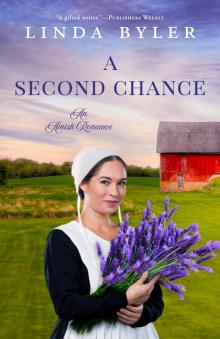 A Second Chance
A Second Chance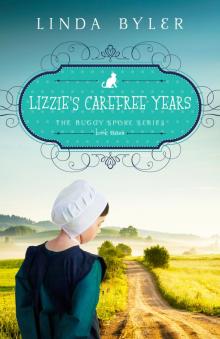 Lizzie's Carefree Years
Lizzie's Carefree Years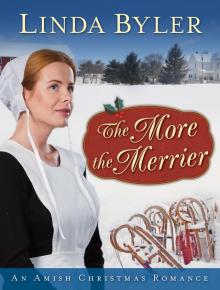 The More the Merrier
The More the Merrier Love in Unlikely Places
Love in Unlikely Places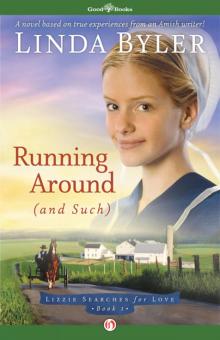 Running Around (and Such)
Running Around (and Such) Wild Horses
Wild Horses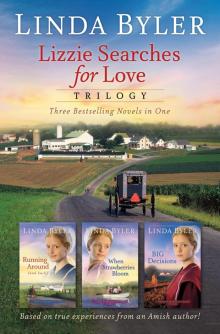 Lizzie Searches for Love Trilogy
Lizzie Searches for Love Trilogy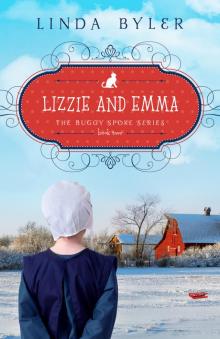 Lizzie and Emma
Lizzie and Emma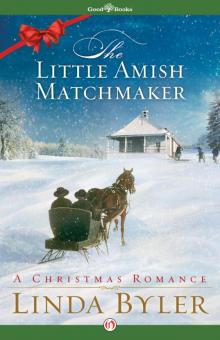 Little Amish Matchmaker
Little Amish Matchmaker The Witnesses
The Witnesses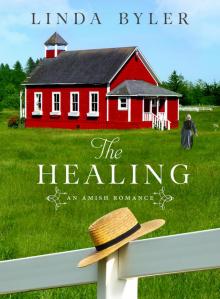 The Healing
The Healing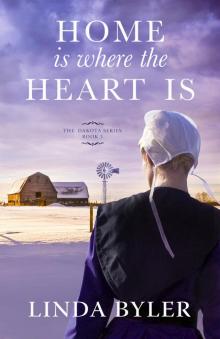 Home Is Where the Heart Is
Home Is Where the Heart Is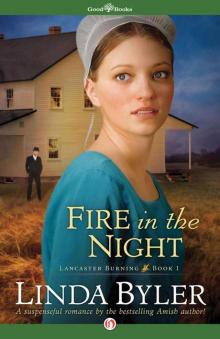 Fire in the Night
Fire in the Night When Strawberries Bloom
When Strawberries Bloom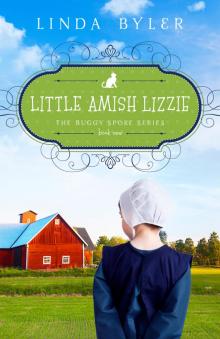 Little Amish Lizzie
Little Amish Lizzie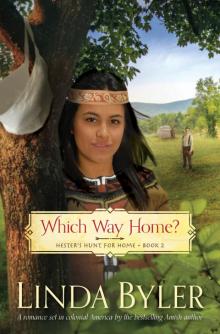 Which Way Home?
Which Way Home?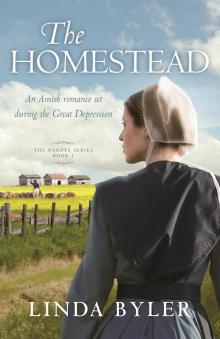 The Homestead
The Homestead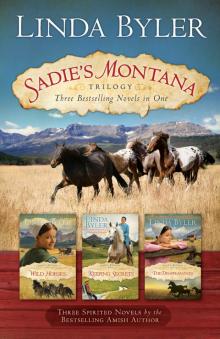 Sadie’s Montana Trilogy
Sadie’s Montana Trilogy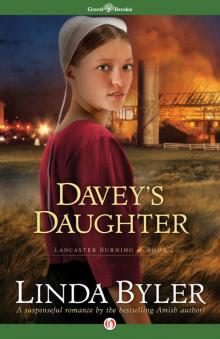 Davey's Daughter
Davey's Daughter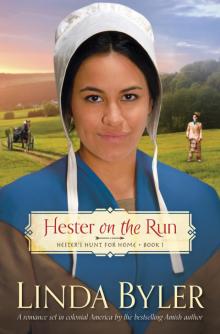 Hester on the Run
Hester on the Run Disappearances
Disappearances Big Decisions
Big Decisions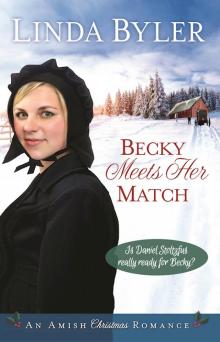 Becky Meets Her Match
Becky Meets Her Match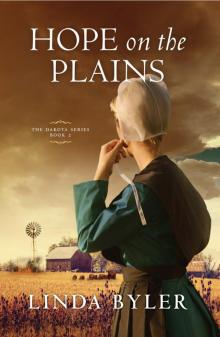 Hope on the Plains
Hope on the Plains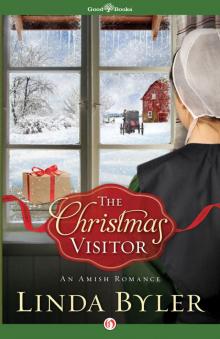 Christmas Visitor
Christmas Visitor